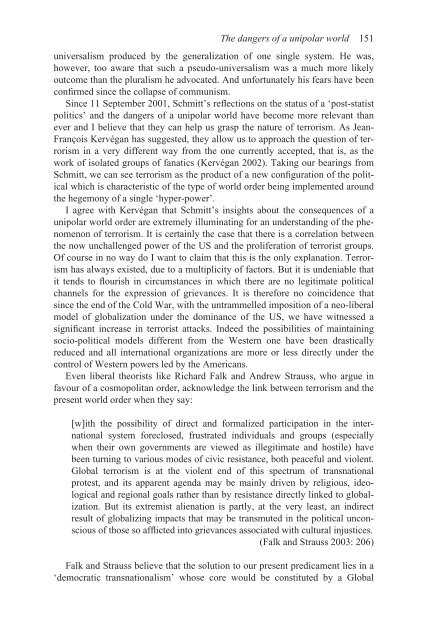The International Political Thought of Carl Schmitt: Terror, Liberal ...
The International Political Thought of Carl Schmitt: Terror, Liberal ...
The International Political Thought of Carl Schmitt: Terror, Liberal ...
Create successful ePaper yourself
Turn your PDF publications into a flip-book with our unique Google optimized e-Paper software.
<strong>The</strong> dangers <strong>of</strong> a unipolar world 151<br />
universalism produced by the generalization <strong>of</strong> one single system. He was,<br />
however, too aware that such a pseudo-universalism was a much more likely<br />
outcome than the pluralism he advocated. And unfortunately his fears have been<br />
confirmed since the collapse <strong>of</strong> communism.<br />
Since 11 September 2001, <strong>Schmitt</strong>’s reflections on the status <strong>of</strong> a ‘post-statist<br />
politics’ and the dangers <strong>of</strong> a unipolar world have become more relevant than<br />
ever and I believe that they can help us grasp the nature <strong>of</strong> terrorism. As Jean-<br />
François Kervégan has suggested, they allow us to approach the question <strong>of</strong> terrorism<br />
in a very different way from the one currently accepted, that is, as the<br />
work <strong>of</strong> isolated groups <strong>of</strong> fanatics (Kervégan 2002). Taking our bearings from<br />
<strong>Schmitt</strong>, we can see terrorism as the product <strong>of</strong> a new configuration <strong>of</strong> the political<br />
which is characteristic <strong>of</strong> the type <strong>of</strong> world order being implemented around<br />
the hegemony <strong>of</strong> a single ‘hyper-power’.<br />
I agree with Kervégan that <strong>Schmitt</strong>’s insights about the consequences <strong>of</strong> a<br />
unipolar world order are extremely illuminating for an understanding <strong>of</strong> the phenomenon<br />
<strong>of</strong> terrorism. It is certainly the case that there is a correlation between<br />
the now unchallenged power <strong>of</strong> the US and the proliferation <strong>of</strong> terrorist groups.<br />
Of course in no way do I want to claim that this is the only explanation. <strong>Terror</strong>ism<br />
has always existed, due to a multiplicity <strong>of</strong> factors. But it is undeniable that<br />
it tends to flourish in circumstances in which there are no legitimate political<br />
channels for the expression <strong>of</strong> grievances. It is therefore no coincidence that<br />
since the end <strong>of</strong> the Cold War, with the untrammelled imposition <strong>of</strong> a neo-liberal<br />
model <strong>of</strong> globalization under the dominance <strong>of</strong> the US, we have witnessed a<br />
significant increase in terrorist attacks. Indeed the possibilities <strong>of</strong> maintaining<br />
socio-political models different from the Western one have been drastically<br />
reduced and all international organizations are more or less directly under the<br />
control <strong>of</strong> Western powers led by the Americans.<br />
Even liberal theorists like Richard Falk and Andrew Strauss, who argue in<br />
favour <strong>of</strong> a cosmopolitan order, acknowledge the link between terrorism and the<br />
present world order when they say:<br />
[w]ith the possibility <strong>of</strong> direct and formalized participation in the international<br />
system foreclosed, frustrated individuals and groups (especially<br />
when their own governments are viewed as illegitimate and hostile) have<br />
been turning to various modes <strong>of</strong> civic resistance, both peaceful and violent.<br />
Global terrorism is at the violent end <strong>of</strong> this spectrum <strong>of</strong> transnational<br />
protest, and its apparent agenda may be mainly driven by religious, ideological<br />
and regional goals rather than by resistance directly linked to globalization.<br />
But its extremist alienation is partly, at the very least, an indirect<br />
result <strong>of</strong> globalizing impacts that may be transmuted in the political unconscious<br />
<strong>of</strong> those so afflicted into grievances associated with cultural injustices.<br />
(Falk and Strauss 2003: 206)<br />
Falk and Strauss believe that the solution to our present predicament lies in a<br />
‘democratic transnationalism’ whose core would be constituted by a Global
















